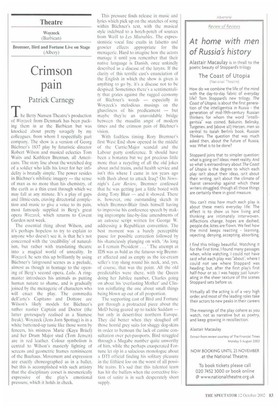Theatre
Woyzeck (Barbican)
Bremner, Bird and Fortune Live on Stage
(Albery)
Crimson pain
Patrick Carnegy
The Betty, Nansen Theatre's production of Woyzeck from Denmark has been packing them in at the Barbican but was knocked about pretty savagely by my colleagues, from whom I respectfully part company. The show is a version of Georg BUchner's 1837 play by futuristic director Robert Wilson and musical eclectics Tom Waits and Kathleen Brennan, all Americans. The story line about the wretched dog of a soldier who kills his lover for her infidelity is brutally simple. The power resides in Buchner's nihilistic imagery — the sense of man as no more than his chemistry, of the earth as a thin crust through which we may fall at any minute. It's a play of gaps and filmic-cuts, craving directorial completion and music to give a voice to its pain, most famously supplied in Berg's great opera Wozzeck, which returns to Covent Garden next week.
The essential thing about Wilson, and it's perhaps hopeless to try to explain to anyone who doesn't see it, is that he's not concerned with the 'credibility' of naturalism, but rather with translating theatre into a magical world of unreality. In Woyzeck he sets this up brilliantly by using Buchner's fairground scenes as a prelude, almost as though in homage to the opening of Berg's second opera, Lulu. A ringmaster introduces his animals as putting human nature to shame, and is gradually joined by the menagerie of characters who will enact the play. The commedia dell'arte's Capitano and Dottore are Wilson's likely models for Bilchner's rather nastier Captain and Doctor (the latter grotesquely realised as a Siamese freak). Woyzeck (Jens Joni Spottag) is in a white buttoned-up tunic like those worn by fencers, his mistress Marie (Kaya Brilel) and her Drum Major stud (Tom Jensen) are in red leather. Colour symbolism is central to Wilson's masterly lighting of screens and geometric frames reminiscent of the Bauhaus. Movement and expression are exactly choreographed as in a ballet, but this is accomplished with such artistry that the disciplinary corset is mesmerically expressive of the play's emotional pressure, which it holds in check. This pressure finds release in music and lyrics which pick up on the snatches of song within Buchner's text, with the musical style indebted to a hotch-potch of sources from Weill to Les Miserables, The expressionistic vocal line exults in falsetto and growler effects appropriate for the menagerie. Hard to imagine how the actors manage it until you remember that their native language is Danish, once unkindly described as a disease of the larynx. If the clarity of this terrific cast's enunciation of the English in which the show is given is anything to go by, it's a disease not to be despised. Sometimes there's a sentimentality that grates against the rugged economy of Btiehner's words — especially in Woyzeck's melodious musings on the ghastliness of his predicament — but maybe they're an unavoidable bridge between the maudlin angst of modern times and the crimson pain of Buchner's
With faultless timing Rory Bremner's first West End show opened in the middle of the Currie/Major scandal and the Labour party conference. It should have been a bonanza but we got precious little more than a recycling of all the old jokes about awful trains, awful health service and isn't this where I came in ten years ago with Bush about to attack Iraq? On Newsnight's Late Review, Bremner confessed that he was getting just a little bored with doing Tony Blair — and it showed. There is, however, one outstanding sketch in which Bremner-Blair finds himself having to improvise his conference speech by making impromptu line-by-line amendments of an autocue script written for George W. addressing a Republican convention. The best moment was a barely perceptible pause for possible correction followed by his shamelessly plunging on with, 'As long as I remain President ... ' The attempt at IDS was as bald as the fatuous wig Bremner affected and as empty as the ice-cream seller's tray slung round his neck, and, yes, of course, that was the point. All the old predictables were there, with the Queen doing her Jubilee number, Charles going on about his 'everlasting Mother' and Clinton reinflating the one about small things being blown up out of all proportion.
The supporting cast of Bird and Fortune got through a protracted piece about the MoD being geared up to tackle Saddam — but only in desert-free northern Europe. They did better when they sloughed off those horrid grey suits for shaggy dog-skins in order to bemoan the lack of canine consultation over pet-passports. Bird struggled through a Mugabe number quite unworthy of him, while the perhaps exasperated Fortune let rip in a salacious monologue about a DTI official finding his solitary pleasure in the filthiest loo on the worst of all possible trains. It's sad that this talented team has hit the buffers when the corrective friction of satire is in such desperately short supply.


































































































 Previous page
Previous page